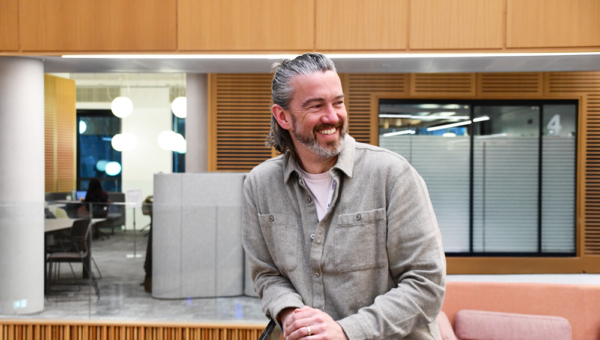Nexus Connect: Sustainability and Resilience in the Supply Chain
Earlier this month, we hosted the 13th Nexus Connect event, bringing together business leaders, academics, and innovators to focus on one of the most pressing issues facing organisations today: sustainability in the supply chain. In an era marked by disruption, global pandemics, political upheavals, and shifting consumer expectations, embedding sustainability isn’t just a moral imperative – it’s a key business strategy.

Our expert panel brought together diverse perspectives across industry and academia:
- Michael Hopkinson | Head of Supply Resilience and Sustainability, Department of Health and Social Care
- Richard Gane | Customer Solutions Director, Ligentia
- Kristina Hetherington | Head of Natural Product Research, Keracol
- Professor Chee Yew Wong | Professor of Supply Chain Management, University of Leeds
Together, they addressed the challenges, opportunities, and practicalities of building resilient, future-proof supply chains, emphasising the crucial role of collaboration, technology, and long-term thinking.

Why sustainability needs to lead, not follow
Across the panel, one thing was clear – sustainability is no longer an optional add-on or afterthought. It must sit at the core of business strategy, aligning closely with organisational goals and ambitions. Driving sustainability offers a range of benefits, not only regulatory compliance and risk management, but also future-proofing, brand differentiation, and talent attraction. With increasing expectations from customers, investors, and regulators, embedding sustainability is now a must-have for any forward-thinking business.
Collaboration & transparency
Recent years have shown just how fragile global supply chains can be. True progress relies on cross-industry, even cross-competitor collaboration – sharing knowledge, data, and best practices.
Collaboration and data sharing across industries can help organisations better anticipate and respond to challenges. Open, transparent data flows allow quicker responses to problems in the supply chain and help organisations make better plans for the future. Competition rules do not limit efforts to improve sustainability, so organisations can benefit by working together. Such collective action can significantly accelerate progress for everyone.
For smaller businesses, especially in Yorkshire, engaging with community networks, sharing resources and expertise, and starting with small, achievable goals is key. Big changes come from lots of small steps that actually get done.
Proactivity, not reactivity
Disruption is the new normal, but too many organisations still wait to act. To build real resilience, companies need to invest early in upskilling, education, and strategic planning. Don’t wait for disruption to strike – plan for it now.
Future-proofing requires forward thinking and cross-functional collaboration -both essential for minimising risk and maintaining business continuity. It also means adopting circular economy principles, designing products and processes that facilitate reuse, recycling, and waste reduction. While these ambitions require investment, especially in infrastructure, they are vital for meeting both environmental targets and growing regulatory demands.
The power of data and technology
Advanced technology, particularly artificial intelligence (AI) and advanced analytics, is reshaping how sustainability is approached in the supply chain. AI is being used to identify efficiencies, predict disruptions, and optimise operations.
Yet the panel emphasised that better tech only helps if you’re asking the right questions. Begin by clearly defining the challenges and desired outcomes, then leverage technology and data to develop smarter, not just faster, solutions that minimise unnecessary energy consumption and keep the focus on meaningful results.
Standardising data, definitions, and metrics around sustainability is also a key priority. Vague terminology, such as “biodegradable,” can create confusion and open the door to greenwashing. Stronger guidance and unified standards are necessary for organisations to communicate and measure their sustainability goals credibly.
Making the case for sustainable investment
Securing buy-in, whether from boards, procurement teams, or partners, means clearly linking sustainability to business impact. Demonstrating the ROI of greener supply chain approaches, from mitigating risk, future-proofing the business, unlocking new markets, and appealing to a new generation of employees and customers is key.
Procurement processes, especially in the public sector, are evolving to prioritise value and sustainability over cost alone. This shift is setting new standards for suppliers and partners, unlocking wider benefits, including risk mitigation, regulatory compliance, supply stability, and enhanced reputation.
Sustainability investment goes beyond compliance -it can deliver real commercial returns. Internal investments that reduce costs or generate operational efficiencies are far more likely to win buy-in from stakeholders. Making these benefits central to your business case helps maintain momentum at every level. For publicly funded bodies like the NHS, there’s a strong case for building a circular economy, but it depends on government direction and infrastructure investment.
Advice for SMEs – education, community, and taking the first step
Small and medium enterprises (SMEs) play a critical role in building a more sustainable supply chain landscape. For SMEs, prioritising collaboration within local networks, ongoing education in best practices, and clear, achievable sustainability goals is key. Starting with manageable initiatives and scaling up efforts as capacity grows is often more effective than aiming for sweeping changes that risk failure.
Designing operations and spaces with sustainability in mind, from materials, and energy use to waste, and biodiversity, helps future-proof the business while reducing environmental impact.
Education is a vital enabler, and more comprehensive training in sustainable supply chain management, carbon reporting, and emissions reduction within schools and universities is a necessary next step for the sector. Inspiring the younger generation and tapping into their passion could accelerate sector-wide progress.
Final reflections
As this lively panel made clear, sustainability in the supply chain isn’t a static or one-size-fits-all challenge. It’s a moving target, requiring organisations to rethink strategy, embrace collaboration, make better use of technology, and stay laser-focused on long-term value.
By embedding sustainability across every strand of our supply chains, and supporting each other through networks like Nexus, we can build resilience, unlock innovation, and ensure a more sustainable future.
Stay connected with Nexus and find out more about future events here.
Latest news

Nexus’ new senior hire to drive innovation and entrepreneurship in West Yorkshire
Nexus, the University of Leeds’s innovation hub, has appointed Mark Mildren as Head of Innovation Programmes & Partnerships to lead its expanding innovation and entrepreneurship initiatives.
Read article
Nexus Meets… Dashe
Andrew Woodward and Steve Bullen from Dashe speak to us as part of our Nexus Meets series.
Read article
Nexus Meets… Microneedle Solutions
Henry Dunne from Microneedle Solutions speaks to us as part of our Nexus Meets series.
Read article




